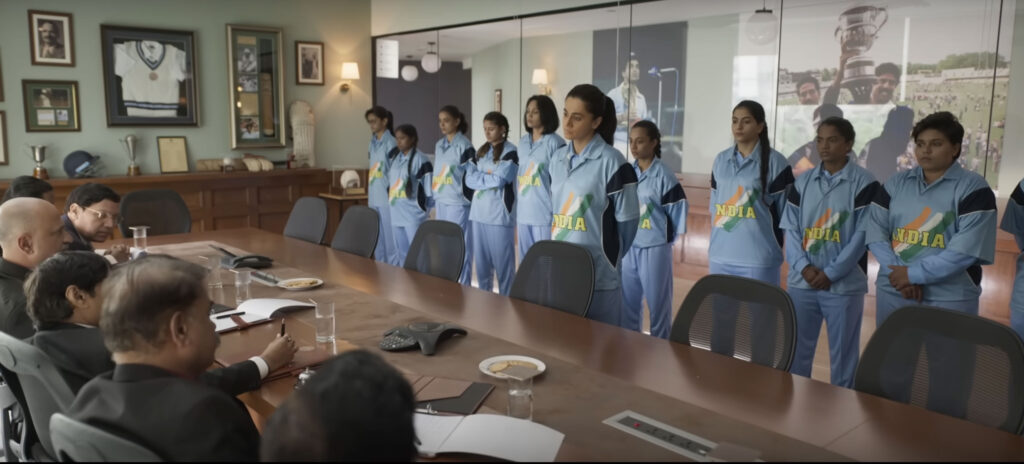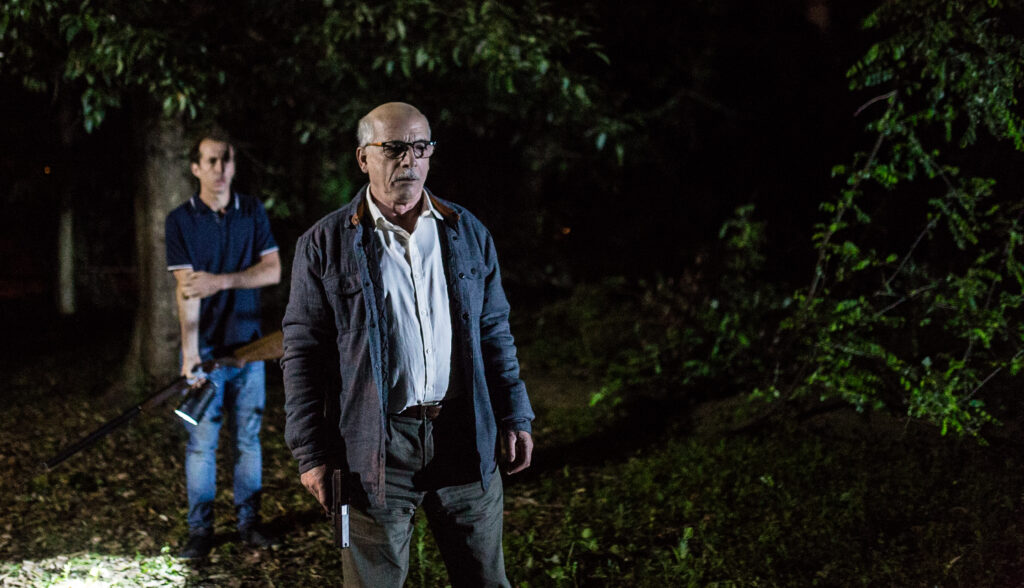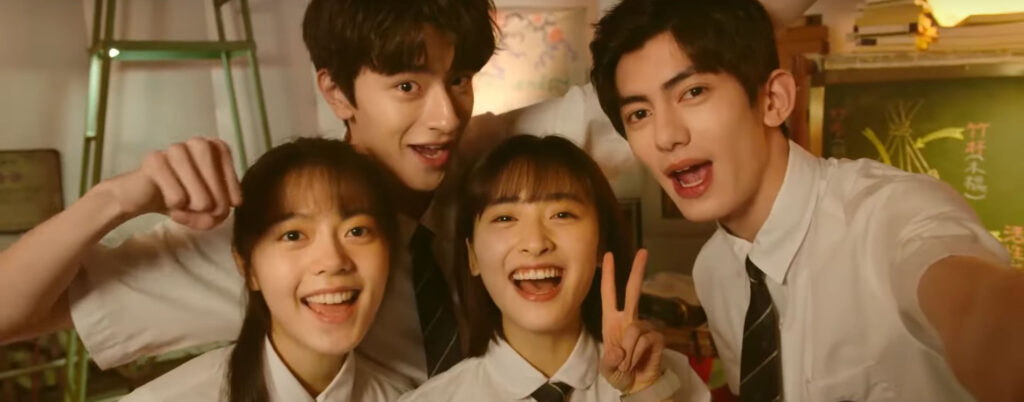August 15, 2022
by Carla Hay

Directed by Thomas Daneskov
Norwegian and Danish with subtitles
Culture Representation: Taking place in Aurland, Norway, the comedy/drama film “Wild Men” features a predominantly white cast of characters (with a few people of Middle Eastern heritage) representing the working-class and middle-class.
Culture Clash: A middle-aged married father, who wants to leave his modern life behind and live life in the wilderness as a Viking, befriends a drug smuggler who wants to hide for very different reasons.
Culture Audience: “Wild Men” will appeal primarily to people interested in darkly comedic films about male bonding and unlikely friendships.

The ending of the comedy/drama “Wild Men” is very predictable and requires some suspension of disbelief regarding law enforcement, but this movie is ultimately an entertaining story about two strangers and their unlikely friendship as outlaws. Their story has less to do with whether or not they care about being arrested and has more do with why these two lost souls want to run away from lives that make them miserable. The movie’s droll comedy and above-average performances from the cast members prevent “Wild Men” from sinking into forgettable mediocrity.
Directed by Thomas Daneskov (who co-wrote the “Wild Men” screenplay with Morten Pape), “Wild Men” was filmed on location in the municipality of Aurland, Norway. The movie had its world premiere at the 2021 Tribeca Film Festival in New York City. “Wild Men” goes through some expected scenarios that are often seen in chase movies when two strangers meet and team up to evade being caught for reasons that are similar or the same.
In “Wild Men,” Martin (played by Rasmus Bjerg) is a man in his 40s who is first seen by himself in a snowy wilderness. He’s dressed as a Viking (including wearing animal fur) and he is sobbing for reasons that are explained later in the movie. Armed with a bow, arrows and an axe, Martin tries to kill a deer for food, but the wounded deer runs away. The most that Martin can get for that night’s meal is a frog, which he eats around a campfire.
Martin is not living in a medieval time period. He is man living in the 21st century, but he wants to drop out of modern society and live as a Viking. Martin isn’t completely “off the grid,” because he goes into a gas station convenience store to get some food. However, he doesn’t want to pay with money. He wants to barter for the food, like a medieval Viking would.
Martin offers his deerskin, axe and three packs of cigarettes (a sign that he hasn’t completely left modern life behind) in exchange for the pile of groceries that he wants to get. He insists that this bargain can be made to a shocked young clerk named Petter (played by Jonas Strand Gravli), who tries in vain to explain to Martin that Martin can only get the groceries by paying with money. Martin gets loud and angry when insisting on having his way.
Eventually, the store manager (played by Ørjan Steinsvik) comes out of a back room to see what all the commotion is about near the store counter. Martin and the manager get into a physical brawl where Martin beats up the manager, takes the merchandise, and then goes back into hiding in the wooded area near the mountains. An elderly police captain named Øyvind (played by Bjørn Sundquist) later arrives to take a report about this robbery and assault. This easygoing police officer is also on the alert for three drug dealers who are believed to be in the area.
Meanwhile, those three drug dealers are traveling by car nearby and are talking about their latest smuggling job. Based on their conversation, Musa (played by Zaki Youssef), the car driver who is in his 40s, is the most experienced drug smuggler of the three. He’s reluctant to have his two younger cohorts/car passengers—Simon (played by Marco Ilsø) and Bashir (played by Jonas Bergen Rahmanzadeh)—along for this upcoming smuggling job on a ferry because he thinks three men together would look suspicious.
Suddenly, a reindeer appears on the road, and the car accidentally hits the deer, which plows through the windshield. It’s a bloody car wreck that leaves Simon and Bashir unconscious and a dazed Musa with a deep wound on his left leg. Musa stumbles out of the car and barely checks to see if Simon and Bashir are alive. Musa has a duffel bag full of cash that he takes with him as he stumbles into the woods.
It should come as no surprise that Martin ends up finding Musa. He treats Musa’s wound by stitching it up while Musa screams in agony. Martin tells Musa that he has a cell phone and a first-aid kit, which are more signs that Martin is not really ready to leave modern life completely behind. Martin isn’t curious to know why Musa doesn’t want to see a doctor for Musa’s leg wound. Musa doesn’t tell Martin right away that he’s a hashish smuggler or that Musa got into a car accident with two other people.
Instead, Musa lets Martin think that Musa is a hiker who got injured during a solo trip. Martin tells Musa that he wants to live as a reclusive Viking. Martin then eventually tells Musa that he robbed a grocery store and is hiding from police. And now, they both have a reason to help each other evade the law. Musa and Martin also bond over their national origin, since they are both originally from Denmark.
Eventually, more about Martin’s life is revealed. He’s a married father of two daughters: Sally (played by Katinka Evers-Jahnsen), who’s about 7 or 8 years old, and Luna (played by Thea Lundtoft Larsen), who’s about 5 or 6 years old. Martin has lied to his wife Anne (played by Sofie Gråbøl), by telling her that he’s away at a teambuilding seminar. Martin’s profession isn’t stated in the movie, but it’s mentioned that he has an office job that he thinks is boring and wants to quit. As part of his mid-life crisis, he wants to “drop out” of society.
Due to certain circumstances that won’t be revealed in this review, Anne is contacted by police and is shocked to find out that Martin is wanted for robbery and assault. Anne goes to this remote area to answer questions in the police investigation and to help in the search for Martin. Sally and Luna are also on this trip. None of this is spoiler information because it’s in the “Wild Men” trailer.
Martin and Musa eventually get into more trouble with the local police, so the two outlaws leave the area where they were camping. During their misadventures in evading capture, Martin and Musa go to a Viking village theme park led by a bombastic Viking enthusiast named Henrik (played by Rune Temte), who irritates Martin for bringing in modern elements to the theme park. For example, Martin can’t believe that the theme park serves processed bread and expects people to pay by money instead of bartering.
Meanwhile, Øyvind and two of his subordinates—middle-aged and cautious Eigil (played by Tommy Karlsen) and young and eager Tore (played by Håkon T. Nielsen)—are in hot pursuit of Martin and Musa. And let’s not forget Simon and Bashir, who were left unconscious in the car wreck. Once these two cronies find out that Musa has gone missing with the money, it’s not something they’re going to let go of easily.
“Wild Men” is not as cleverly written as a Joel and Ethan Coen movie about quirky outlaws on the run. “Wild Men” stumbles in the last third when about 25 cops suddenly show up as a search party team, but then are nowhere to be found during some crucial scenes. “Wild Men” never realistically explains why only three cops (Øyvind, Eigil and Tore) are doing the most of the chasing when more police officers are available. In other words, it’s a low-budget movie that couldn’t afford a larger number of cast members with speaking roles.
Musa eventually opens up to Martin about being an absentee father. Musa’s ex-girlfriend won’t let Musa see their son, who is almost 2 years old. Martin essentially wants to abandon his wife and children. The movie doesn’t glorify these irresponsible fathers but shows what happens when parents who are broken inside can’t really think of anyone else beyond their own immediate needs and emotional problems.
All of the cast members skillfully balance the comedy and drama of “Wild Men.” However, nothing about this movie is truly outstanding, and the story could have used more suspense. As soon as Martin stitches up Musa’s leg wound when they first meet, you just know how “Wild Men” will show the rest of their friendship. The movie is a lot like Martin and Musa: flawed, eccentrically engaging, and with a lot of room for improvement.
Samuel Goldwyn Films released “Wild Men” in select U.S. cinemas on June 17, 2022. The movie was released on digital and VOD on August 5, 2022. “Wild Men” was released in Italy in 2021.


















